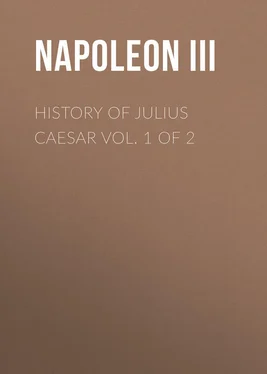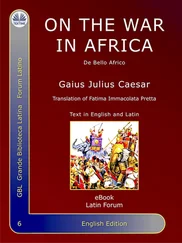Attalus I., King of Pergamus, gave to the Sicyonians 11,000 medimni of wheat. (Titus Livius, XXXII. 40.) – Eumenius II. lent 80,000 to the Rhodians. (Polybius, XXXI. xvii. 2.)
Strabo, XII. viii. § 11.
Athenæus, XV. xxxviii. 513, ed. Schweighæuser.
The Sea of Marmora took its name from these quarries of marble.
Κυξικηνοἱ στατἡρες, whence the word sequins .
Strabo, XIII. i. § 23.
Strabo, XV. iii. § 22.
Titus Livius, XXXII. 16; XXXVI. 43.
Titus Livius, XXXVII. 8.
The petty king Moagetes, who reigned at Cibyra, in Phrygia, gave a hundred talents and 10,000 medimni of corn (Polybius, XXII. 17. – Titus Livius, XXXVIII. 14 and 15); Termessus, fifty talents; Aspendus, Sagalassus, and all the cities of Pamphylia, paid the same (Polybius, XXII. 18 and 19); and the towns of this part of Asia contributed, at the first summons of the Roman general, for about 600 talents (3,500,000 francs [£140,000]); they also delivered to him about 60,000 medimni of corn.
Titus Livius, XXXIX. 6.
Manlius, although he had been despoiled on his way home of a part of his immense booty by the mountaineers of Thrace, displayed, at his triumph, crowns of gold to the weight of 212 pounds, 220,000 pounds of silver, 2,103 pounds of gold, more than 127,000 Attic tetradrachms, 250,000 cistophori, and 16,320 gold coins of Philip. (Titus Livius, XXXIX. 7.)
Appian, Wars of Mithridates , lxiii.
Arrian, Campaigns of Alexander , I. xx. § 3. – Diodorus, XVII. 23.
Strabo, XIV. ii. 565.
Strabo, XIV. i. § 6.
Pliny, Natural History , V. 31.
Strabo, XIV. iii. § 6.
Titus Livius, XXXVIII. 39.
Scylax, Periplus , 39, ed. Hudson. – Dio Cassius, XLVII. 34.
Herodotus, I. 176.
Pliny, Natural History , V. 28.
Strabo, XIV. v. § 2.
Strabo, XIV. v. § 2.
Tarsus had still naval arsenals in the time of Strabo (XIV. v. § 12 et seq. ).
Arrian, Anabasis , II. 5.
Polybius, XXII. 7.
Seleucus founded sixteen towns of the name of Antiochia , five of the name of Laodicea , nine of the name of Seleucia , three of the name of Apamea , one of the name of Stratonicea , and a great number of others which equally received Greek names. (Appian, Wars of Syria , lvii. 622.) – Pliny ( Natural History , VI. xxvi. 117) informs us that it was the Seleucides who collected into towns the inhabitants of Babylonia, who before only inhabited villages ( vici ), and had no other cities than Nineveh and Babylon.
Pliny ( Natural History , VI. 26, 119) mentions one of these towns which was 70 stadia in circuit, and in his time was reduced to a mere fortress.
Strabo, XVI. ii. § 5. – Pausanias, VI. ii. § 7.
John Malalas, Chronicle , VIII. 200 and 202, ed. Dindorf.
Strabo, XVI. ii. § 4.
Strabo, XVI. ii. § 6.
Strabo, XVI. ii. § 10.
It was raised on a terrace a thousand feet long by three hundred feet broad, and was built with stones 70 feet long.
The empire of Seleucus comprised seventy-two satrapies. (Appian, Wars of Syria , lxii. 630.)
Polybius, X. 27. Ecbatana paid to Antiochus III. a tribute of 4,000 talents (Attic talents = 23,284,000 francs [£931,360]), the produce of the casting of silver tiles which roofed one of its temples. Alexander the Great had already carried away those of the roof of the palace of the kings.
The country of Gerra, among the Arabians, paid 500 talents to Antiochus (Attic talents = 2,910,500 francs [£116,420]). (Polybius, XIII. 9.) – There was formerly a great quantity of gold in Arabia. (Job xxviii. 1, 2. – Diodorus Siculus, II. 50.)
Strabo, XVI. iii. § 3.
Strabo, XI. ii. 426 et seq.
Pliny, Natural History , VI. 11.
Polybius, V. 54. If, as is probable, Babylonian talents are intended, this would make about 7,426,000 francs [£297,040], Seleucia, on the Tigris, was very populous. Pliny ( Natural History , VI. 26) estimates the number of its inhabitants at 600,000. Strabo (XVI. ii. § 5) tells us that Seleucia was even greater than Antioch. This town, which had succeeded Babylon, appears to have inherited a part of its population.
In 565, Antiochus III. gives 15,000 talents (Euboic talents = 87,315,000 francs [£3,492,600]). (Polybius, XXI. 14. – Titus Livius, XXXVIII. 37.) In the treaty of the following year, the Romans stipulated for a tribute of 12,000 Attic talents of the purest gold, payable in twelve years, each talent of 80 pounds Roman (69,852,000 francs [£2,794,080]). (Polybius, XXII. 26, § 19.) In addition to this, Eumenes was to receive 359 talents (2,089,739 francs [£83,589]), payable in five years (Polybius, XXII. 26, § 20). – Titus Livius (XXXVIII. 38) says only 350 talents.
The father of Antiochus, Seleucus Callinicus, sent to the Rhodians 200,000 medimni of wheat (104,000 hectolitres). (Polybius, V. 89.) In 556, Antiochus gave 540,000 measures of wheat to the Romans. (Polybius, XXII. 26, § 19.)
According to Strabo (XV. 3), wheat and barley produced there a hundredfold, and even twice as much, which is hardly probable.
Strabo, XVI. 2.
Athenæus, XII. 35, p. 460, ed. Schweighæuser.
Polybius, XXXI. 3. – There were seen in these festivals a thousand slaves carrying silver vases, the least of which weighed 1,000 drachmas; a thousand slaves carrying golden vases and a profusion of plate of extraordinary richness. Antiochus received every day at his table a crowd of guests whom he allowed to carry away with them in chariots innumerable provisions of all sorts. (Athenæus, V. 46, p. 311, ed. Schweighæuser.)
Polybius, V. 79.
Titus Livius, XXXVII. 37.
Strabo, XVI. 2.
Polybius, V. 70.
Titus Livius, XXXIII. 41. – Polybius, V. 59. – Strabo, XVI. 2.
Strabo, XVI. 2.
Читать дальше












